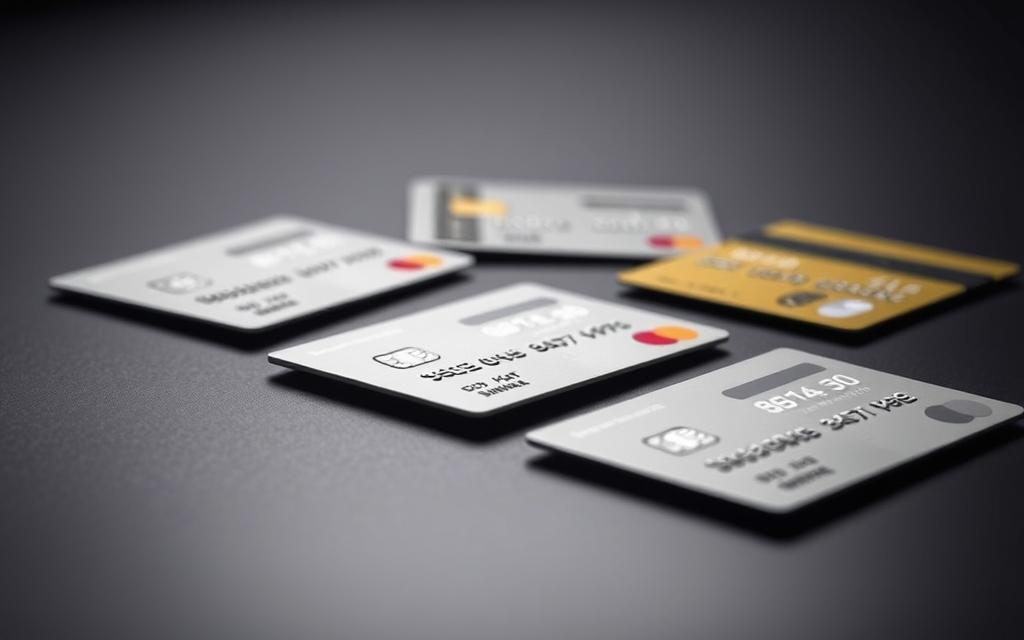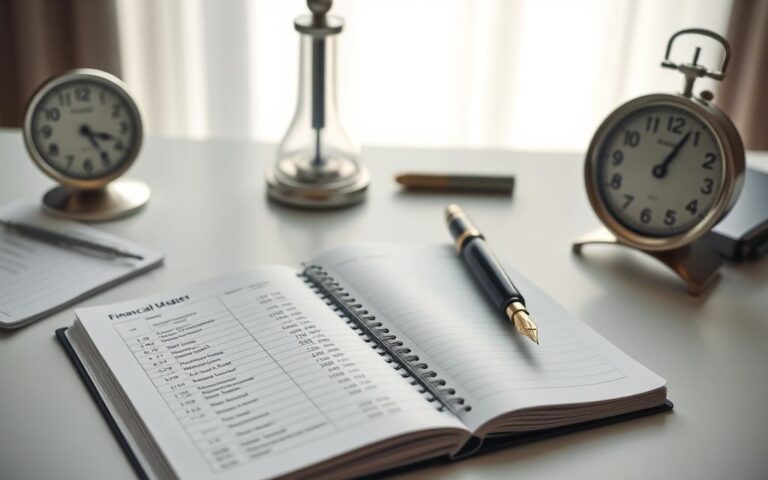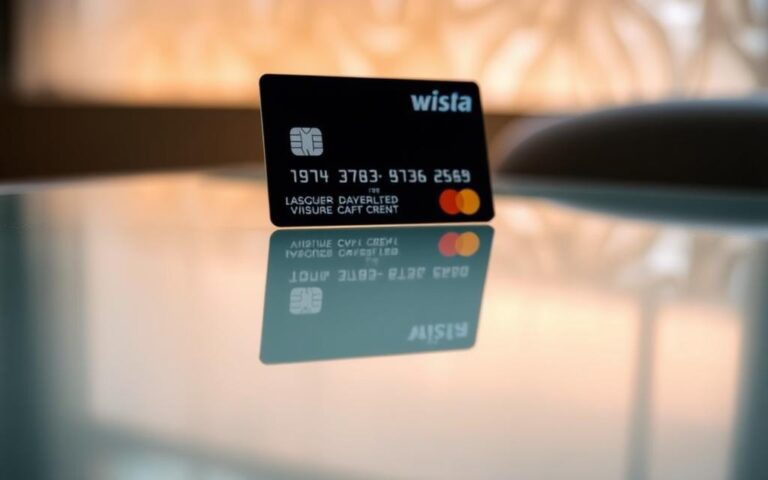Advertisement
Nearly 43% of Americans have a limited or poor credit history. This makes it hard to get loans or credit cards. Having a good credit score is key for financial health.
For newcomers to credit, picking the right credit card can be tough. The best cards for beginners have low fees, easy-to-manage credit limits, and help with learning to build credit.
When building credit with a beginner credit card, look for cards that report to big credit bureaus. Also, find cards with tools to track your progress. The right card can help start a positive credit history.
Understanding Credit Cards for Beginners
For those new to credit, it’s key to know how credit cards work. They offer convenience, security, and a chance to build credit. This knowledge helps in making smart financial choices.
What is a Credit Card?
A credit card is a loan that lets you borrow money for purchases, bills, or cash advances. It’s like a credit line with a set limit, called the credit limit.
Key characteristics of a credit card include:
- A credit limit, which is the maximum amount that can be charged on the card
- An interest rate, or APR, which is charged on outstanding balances
- Fees, such as annual fees, late fees, or foreign transaction fees
- Rewards or benefits, like cashback, travel points, or insurance
How Do Credit Cards Work?
Credit cards let users make purchases up to their credit limit. When you buy something, the card issuer pays the merchant. Then, you must repay the issuer.
The process involves several key steps:
- The cardholder applies for a credit card and, upon approval, is assigned a credit limit.
- The cardholder can then use the card to make purchases or obtain cash advances.
- The card issuer sends a statement to the cardholder showing the transactions, total amount due, and minimum payment required.
- The cardholder must make at least the minimum payment by the due date to avoid late fees and penalties.
Common Terms You Should Know
Knowing common credit card terms is crucial for using them well. Here are some key terms:
| Term | Definition |
|---|---|
| APR (Annual Percentage Rate) | The interest rate charged on outstanding balances |
| Credit Limit | The maximum amount that can be charged on the card |
| Minimum Payment | The smallest amount that must be paid each billing cycle |
| Cash Advance | Withdrawing cash using the credit card |
Benefits of Using Credit Cards for Beginners
Credit cards offer many benefits for beginners, like building credit, better security, and rewards. It’s key for new users to know these advantages to make smart money choices.
Building Credit History
One big plus of credit cards for beginners is the chance to build credit history. Using a card wisely shows you can handle credit well. This is important for getting loans or mortgages later on.
To build credit well, do these:
- Make on-time payments
- Keep credit utilization ratios low
- Check your credit report often
Convenience and Security
Credit cards are more convenient and secure than cash or debit cards. They’re accepted everywhere and protect against fraud. Many cards also have extra security features, like:
| Security Feature | Description | Benefit |
|---|---|---|
| Zero Liability Protection | Protects cardholders from unauthorized transactions | Reduces financial risk |
| EMV Chip Technology | Provides an additional layer of security against card skimming | Enhances transaction security |
| Real-time Transaction Alerts | Notifies cardholders of transactions in real-time | Helps detect fraudulent activity promptly |
Rewards and Perks
Many beginner-friendly credit cards come with rewards and perks. These can include cashback, travel points, and more. These benefits add value to the cardholder.
When picking a credit card, think about the rewards and perks. Make sure they fit your financial needs and how you spend money.
Types of Credit Cards Available
For those new to credit cards, it’s key to know the different types. There are secured, unsecured, and student credit cards. Each has its own features and benefits.
Secured Credit Cards
Secured credit cards are for those with poor or no credit. You need to put down a deposit, which becomes your credit limit. This is a good choice for building or fixing your credit score.
- Key Benefits: Helps build credit, lower risk for lenders
- Considerations: Requires a security deposit, may have higher fees
Unsecured Credit Cards
Unsecured credit cards don’t need a deposit. They’re for people with good credit and offer more perks. But, getting approved might be tougher.
- Rewards programs, such as cashback or travel points
- Introductory APR offers, such as 0% interest for a promotional period
- Purchase protection and travel insurance
Student Credit Cards
Student credit cards are for newbies. They have easier approval and help build a good credit score. These cards often offer rewards and have smaller credit limits.
Example: A student credit card might offer 2% cashback on dining and a $500 credit limit.
In conclusion, the right credit card for beginners depends on their financial situation and needs. Knowing about secured, unsecured, and student cards helps make a smart choice for your first credit card.
Key Features to Look for in Beginner Credit Cards
Choosing a credit card as a beginner is a big decision. Knowing the key features can guide you. It helps you understand the complex world of credit.
Experts say, “Understanding your credit card terms is as important as knowing your financial needs.” (
Financial Expert, Credit Matters
)
Annual Fees
First, consider the annual fee. Some cards have no fee, while others can cost over $100. Think about the benefits and costs to see if it’s worth it.
- Choose cards with no annual fee if you’re new.
- Look at the perks of cards with fees, like rewards or travel benefits.
Interest Rates and APR
It’s key to know your credit card’s interest rate and APR. The APR is the interest rate on your balance if you don’t pay in full. APRs can change with the market.
To avoid high interest, pay your balance in full each month. If you can’t, make timely payments to reduce interest.
Credit Limits and Minimum Payments
Your credit limit is the max you can charge. Also, know the minimum payment each month. Paying more than the minimum is smart to lower debt and interest.
As a beginner, managing your credit usage is crucial. Keep your usage under 30% of your limit to build good credit.
How to Choose the Right Credit Card
Choosing a credit card can be tough for beginners. It’s important to know your financial situation. Look at your needs, compare offers, and understand the terms.
Assessing Your Financial Needs
Start by figuring out what you need from a credit card. Think about your income, expenses, and savings goals. Decide if you want a card for building credit, earning rewards, or travel perks. Knowing what you need will help you choose.
Comparing Offers and Features
Credit cards offer different benefits like cashback, travel rewards, or low-interest rates. Compare these to find the best fit for your spending and goals. Look for cards with no annual fees or low APRs if you carry a balance.
- Check the rewards program to ensure it aligns with your spending habits.
- Consider the credit limit and whether it meets your needs.
- Look into additional benefits such as purchase protection or travel insurance.
Reading the Fine Print
Always read the fine print before getting a credit card. Know the terms, fees, interest rates, and repayment terms. Watch out for penalties for late payments or foreign transaction fees.
By understanding your needs, comparing cards, and knowing the terms, you can make a smart choice. This way, you’ll pick a card that helps your financial health and goals.
Steps to Apply for Your First Credit Card
Applying for your first credit card is easy if you know what to do. It involves a few important steps to help you succeed.
Researching Credit Card Options
Start by looking at different credit cards. You’ll find secured credit cards, unsecured credit cards, and student credit cards. Each has its own benefits and needs. For example, secured cards are great for starting your credit journey. Student cards are perfect for those with little to no credit.
Preparing Your Application
After picking a card, get ready to apply. You’ll need your Social Security number, proof of income, and identification. Also, check your credit report for any mistakes that could hurt your application.
| Document | Purpose |
|---|---|
| Social Security number | Identification |
| Proof of income | Assessing creditworthiness |
| Identification | Verifying identity |
Submitting Your Application
Once you’re ready, you can apply online, by phone, or by mail. Double-check your application for errors before you send it. You’ll usually hear back in a few minutes to a few days.
By following these steps, you can apply for your first credit card confidently. Start building your credit history today.
Managing Your Credit Card Responsibly
Managing your credit card well is crucial to avoid financial trouble and build a good credit score. As a beginner, knowing how to handle your credit card is vital for your financial health.
Making On-Time Payments
Making payments on time is key. Late payments can lead to fees and hurt your credit score. To avoid this, set up automatic payments or reminders. Mark payment due dates in your calendar so you never miss a payment.
Here’s a simple table to show how on-time payments affect your credit score:
| Payment History | Credit Score Impact |
|---|---|
| On-time payments | Positive impact |
| Late payments | Negative impact |
Keeping Track of Your Spending
It’s important to watch your spending to stay within your budget and avoid overspending. Check your credit card statements regularly to find ways to save. Use budgeting apps or spreadsheets to track your expenses better.
Understanding Credit Utilization
Credit utilization is the percentage of your available credit used. Keeping this under 30% is advised. High utilization can harm your credit score. Remember, it’s not just about how much you spend, but also your credit limit.
- Keep your credit utilization ratio below 30%.
- Watch your credit limit and adjust your spending.
- Try to pay off your balance in full each month to avoid interest.
By following these tips and being careful with your credit card, you can use it wisely and improve your credit history. For more beginner credit card tips, look for resources that offer tailored advice.
Tips for Building Credit with a Credit Card
For those new to credit, using a credit card wisely is crucial. It’s a great way to start building a good credit score. But, it needs discipline and knowing how to use it right.
Using Your Card Regularly
To build credit, you must use your credit card often. It’s not about using it to the max. Making regular purchases and paying them on time shows you can handle credit well. Try setting up automatic payments for small, regular buys to keep your account active.
Tip: Use your credit card for everyday things like groceries or gas. Pay off the balance each month to avoid interest.
Limiting New Applications
It might be tempting to apply for many credit cards, but it’s important to limit new applications. Each application can lower your credit score temporarily. Applying for too many cards at once can show lenders you’re taking on too much debt.
Be cautious: Too many new applications can hurt your credit score. Only apply for new credit cards when you really need to.
Monitoring Your Credit Report
It’s key to check your credit report often to make sure it’s right. You can get a free report from Equifax, Experian, and TransUnion once a year. Look over your report to spot any mistakes or unauthorized accounts.
Action step: Regularly check your credit report to fix any mistakes and see how your credit is growing.
By following these tips, you can build credit with a credit card. Remember, building credit takes time and requires careful financial habits.
Common Mistakes to Avoid as a New Cardholder
Knowing the mistakes to avoid with a credit card can save you from financial trouble. As a beginner, it’s natural to be excited about your new credit card. But, it’s important to use it wisely.
Ignoring the Due Date
One big mistake new cardholders make is ignoring the payment due date. Missing a payment can lead to late fees and hurt your credit score. To avoid this, set up automatic payments or reminders.
Maxing Out Your Credit Limit
Using up all your credit can damage your credit score. Keep your credit usage under 30% to show you can handle your credit well. For example, if your limit is $1,000, aim for a balance under $300.
Failing to Understand Fees
Many new cardholders overlook the fees that come with their cards. These include annual fees, foreign transaction fees, and late fees. Knowing these fees can help you avoid extra charges. Always read the fine print and ask about any fees you’re unsure about.
By knowing these common mistakes and avoiding them, you can use your credit card well. This will help you build a strong credit history. Remember, using your credit card responsibly is key to enjoying its benefits.
Frequently Asked Questions About Credit Cards for Beginners
For those new to credit cards, knowing how they work and their benefits is key to financial health. It’s normal to have questions about credit cards. Answering these can help you make smart choices.
What Credit Score Do I Need?
To get a credit card, you need a score that meets the lender’s standards. For beginners, knowing that scores range from 300 to 850 is important. A score of 700 or higher is good, but some cards are available to those with lower scores.
Before applying for a credit card, check your score. It affects the interest rate you get and if you’re approved. You can check your score for free online.
How Can I Increase My Credit Limit?
To increase your credit limit, show you can handle credit well. This means making payments on time, using less than 30% of your credit, and checking your report for errors.
You can also ask your card issuer to increase your limit. Be ready to share financial info to support your request. Some issuers might raise your limit if you manage your credit well over time.
| Factor | Impact on Credit Limit |
|---|---|
| Payment History | On-time payments can lead to an increase |
| Credit Utilization | Keeping utilization low can help |
| Credit Report | Monitoring for errors is crucial |
What Should I Do If I Miss a Payment?
If you miss a payment, act fast. Pay as soon as you can to avoid extra fees and interest. Then, talk to your card issuer about what happened. They might waive the late fee or help you get back on track.
To avoid missing payments, set up automatic payments or reminders. This can help keep your credit score high and reduce stress.
“Payment history accounts for 35% of your credit score, making it one of the most significant factors. Missing payments can negatively impact your score, so it’s vital to make timely payments.”
By understanding and addressing these common questions, beginners can confidently use credit cards. Remember, managing your credit card well is essential for a strong financial base.

Conclusion: Starting Your Credit Journey Strong
Building credit is key to a secure financial future. Learning about credit cards, picking the right one, and using it wisely helps you build a strong credit base.
Key Takeaways
We’ve covered why credit history matters, the perks of credit cards, and the various types out there. We also talked about what to look for in a beginner credit card and how to manage it well.
Now, you’re ready to start your credit journey. Look for beginner-friendly credit cards that fit your needs. Applying for one is a big step towards building credit with a beginner credit card and securing your financial future.



